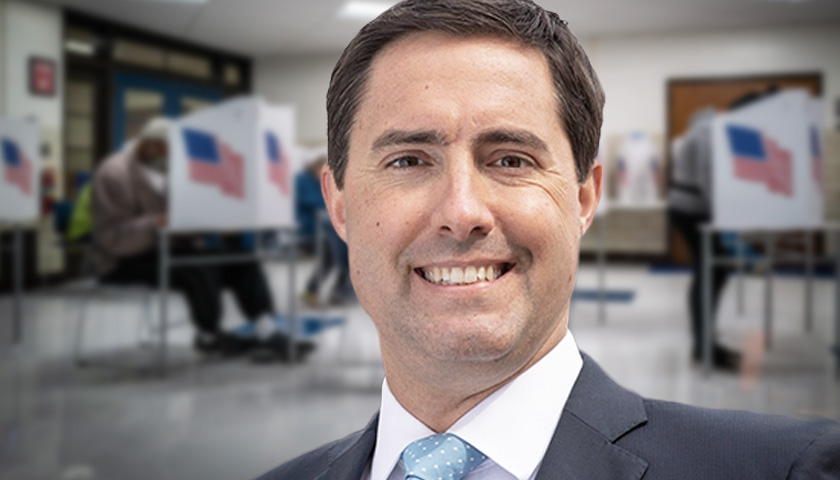COLUMBUS, Ohio – About 400 or more protesters lined the Third Street stretch of Capitol Square downtown Tuesday morning as a Ohio House of Representatives committee prepared to hear more testimony on the proposed Vaccine Choice and Anti-Discrimination Act that seeks to ban businesses from mandating workers to get vaccinated as a condition of employment.
Tea Party Patriots Action and affiliates organized the protest as the first of several planned across the country as well as two more sets in Ohio communities during the next five days.
Protesters held signs such as, “No Forced Vaccines,” “Yes to Medical Freedom,” “Medical Freedom is a Human Right.” and “No More DeWine,” the latter a reference to Ohio Gov. Mike DeWine.
As protesters voiced support for House Bill 248, legislators on the House Health Committee began gathering around 11 a.m. for what became a four-hour marathon to hear opponents and proponents of the legislation present views on the legislation inspired by, but not specifically targeting, the COVID-19 vaccination that about 60 percent of eligible Ohio adults and teens have received.
But fear of employer-mandated COVID vaccination spurred first-term State Representative Jennifer Gross (R-West Chester Township) to introduce the legislation in early April.
By mid-July, hospital systems in the capital city and other areas of the state began telling their staff they need to get vaccinated by this fall or face dismissal because of the healthcare mission of the institutions. Some other businesses were also given notice of such requirements, citing concerns about the transmission of the disease in the workplace.
Healthcare advocates for the most part have opposed the legislation as the nondisclosure aspect sparked fears that preventable diseases – especially those that have protected the broader public for several decades – could become widespread.
Dr. Michael Brady, associate medical director at Nationwide Children’s Hospital in Columbus, said vaccines are quite effective at preventing the spread of infectious disease, citing their effectiveness against polio, mumps, measles, and, in more recent years, bacterial meningitis.
“I fear passage of House Bill 248 will result in a resurgence of those life-changing diseases,” he told committee members. Challenged on the question of freedom not to receive inoculations, he said, “Freedom comes with a responsibility not to cause harm to others.”
Sara Jodka, the Dickenson Wright PLLC attorney representing the Ohio Chamber of Commerce, said taking away the choice of businesses determining their workforce needs protection against preventable disease undermines the state’s status as an “at-will” labor market. She also argued the law already allows for exemptions against vaccinations, including those individuals opposed on medical, religious, and conscience reasons.
Businesses “are doing what they have to do to protect their own workforce,” Jodka said.
Without the option to mandate COVID vaccination, those businesses may have to institute health safety procedures such as mandatory masks, social distancing, and frequent testing. “Those unpopular safety produces will be here for a long time,” she said.
But Scott Shoemaker of Health Freedom Ohio said his family has had several negative effects after getting vaccines, including two of his three children. “Where there’s risk,” the Columbus area resident said, “there must be choice … Sadly, this vaccine issue has become a civil rights issue.”
More protests planned
The high-profile legislation received its sixth hearing amid the traditional summer recess of the General Assembly, prompting the committee to limit testimony to five minutes to maximize the number of views presented.
The legislation did not receive a vote or consideration of amendments at the hearing.
Speaker of the House Robert Cupp (R-Lima) and others in the House leadership asked that further consideration get delayed until the General Assembly reconvenes in mid-September.
“Due to the high interest in this bill, we have directed Chairman Lipp to have a hearing with no amendments or vote,” Cupp wrote in a memo on August 23. “We will then pause hearings on HB 248 while we work with the chairman, the bill’s sponsor, and all interested parties on this important issue.”
The Tea Party Patriots have other protests planned related to medical mandates. In Ohio, those scheduled are a rally on August 25 at Morey Park in Marysville from 3 p.m. to 5 p.m. and one at the Wyandot County Courthouse in Upper Sandusky on August 29 from 2 p.m. to 4 p.m.
– – –
Brian Ball is a reporter for The Ohio Star and The Star News Network. Send tips to [email protected].
Photo by Brian Ball.





